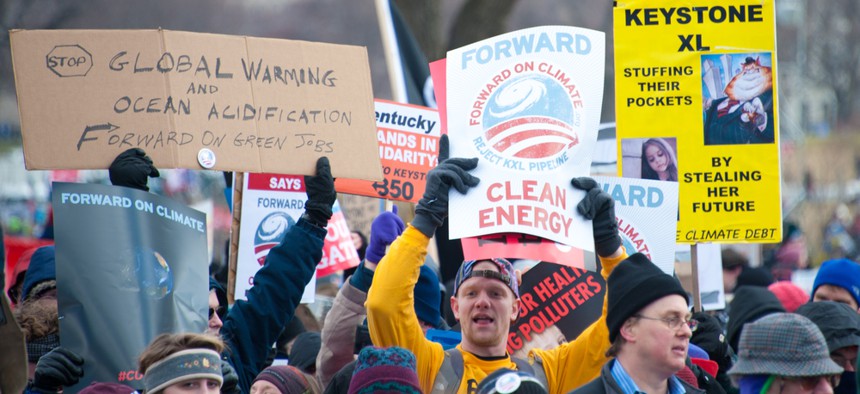
Protestors rally against the Keystone XL project in Washington in February 2013. Rena Schild / Shutterstock.com
White House Hints at Keystone Veto
Obama spokesman notes administration has taken a "dim view" of past Keystone bills.
The White House has begun hinting that President Obama would veto legislation that mandates approval of the Keystone XL oil-sands pipeline.
The House will again approve a Keystone pipeline bill this week, while the Senate is bracing for a close vote next week at the behest of embattled Democrat Mary Landrieu, who faces a very tough Dec. 6 runoff election.
White House press secretary Josh Earnest told reporters traveling with Obama in Myanmar that the White House is against legislation that forces its hand while the federal review of Keystone is ongoing.
"The administration, as you know, has taken a dim view of these kinds of legislative proposals in the past," he said. Earnest said that he hasn't reviewed the specifics of what's before Congress now, but added, "I think it's fair to say that our dim view of these kinds of proposals has not changed."
Earnest stopped shy of flatly waving a veto pen on Obama's behalf, but he noted prior threats on earlier legislation. "There have been previous proposals that I expect would be consistent with proposals that have been discussed overnight. And in evaluating those earlier proposals, we have indicated that the president's senior advisers at the White House would recommend that he veto legislation like that," Earnest said, according to a transcript.
The White House has not issued a formal "statement of administration policy" on the House bill. Those statements often arrive ahead of votes and state whether Obama would veto a bill if it reaches his desk. However, The Washington Post on Thursday cited unnamed aides who said Obama is prepared to veto the bill.
The stronger signals follow somewhat vaguer White House responses last week. Obama, asked about a Keystone bill the day after the midterm elections, declined to address the veto question head on, though he said he would allow the State Department process to "play out."
While a Keystone bill may not be able to clear the lame-duck Senate, the legislation will very likely have more than the 60 votes needed to overcome a filibuster when Republicans take over the chamber next year. But it's unclear whether the new Senate could muster the 67 votes necessary to override a presidential veto.
(Image via Rena Schild / Shutterstock.com )
NEXT STORY: President’s Data Boosters Push Management Agenda







